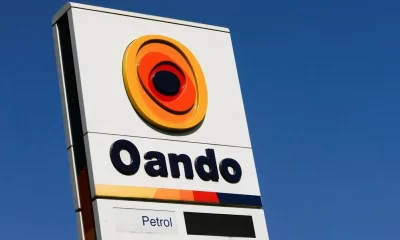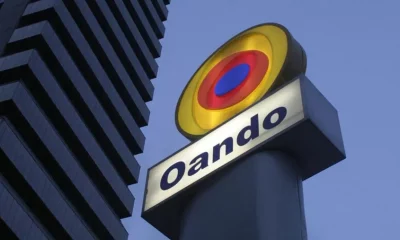In a landmark move that has sent shockwaves through the Nigerian energy sector, Oando Plc, a leading indigenous energy solutions provider, has completed the acquisition of 100% of the shareholding interest in the Nigerian Agip Oil Company (NAOC) from the Italian energy giant, Eni. This transformative deal, valued at a staggering $783 million, not only solidifies Oando’s position as a major player in the industry but also heralds a new era of empowerment for indigenous energy companies in Nigeria.
The acquisition, which has been in the works for the past decade, is a testament to the visionary leadership and unwavering determination of Oando’s Group Chief Executive, Jubril Adewale Tinubu, CON. Tinubu, a serial entrepreneur and a driving force behind Nigeria’s energy revolution, has once again proven his ability to identify strategic opportunities and execute them with precision.
“Today’s announcement is the culmination of 10 years of hard work, resilience, and an unwavering belief that we would realize our ambition,” an elated Tinubu remarked. “It is a win, not just for Oando, but for every indigenous energy player as we take our destiny in our hands.”
This landmark transaction marks a significant shift in the Nigerian energy landscape, as it paves the way for indigenous companies to play a more prominent role in the upstream sector. Tinubu’s visionary leadership and strategic acumen have been widely praised by industry analysts and commentators.
“His visionary mindset and astute business acumen have allowed him to navigate the complexities of the Nigerian market and foster collaborations with leading international companies,” said Ms. Taiwo Alegeh, a foremost oil and gas analyst. “This not only speaks to his own success but also showcases the immense potential within Nigeria’s business landscape.”
The acquisition of NAOC, a company that has been a dominant player in Nigeria’s onshore oil and gas exploration and production, as well as power generation, is a game-changer for Oando. The deal will double the company’s oil equivalent output from 25,000 barrels per day to 50,000 barrels per day, significantly boosting its production and reserves.
“The transaction increases our current participating interests in Oil Mining Licences (OMLs) 60, 61, 62, and 63 from 20 per cent to 40 per cent and increases our ownership stake in the Joint Venture (JV) assets and infrastructure,” Oando stated in its announcement. This includes 40 discovered oil and gas fields, of which 24 are currently producing, as well as approximately 40 identified prospects and leads.
The acquisition also involves 12 production stations, approximately 1,490km of pipelines, three gas processing plants, the Brass River Oil Terminal, and the Kwale-Okpai phases 1 & 2 power plants, with a total nameplate capacity of 960MW, and associated infrastructure. This comprehensive portfolio of assets will undoubtedly strengthen Oando’s position in the Nigerian energy landscape.
Seun Ajayi, another industry analyst, praised Tinubu’s status as a world-class businessman, highlighting his visionary leadership and strategic acquisitions. “This latest acquisition by Oando is a testament to Tinubu’s ability to identify and seize opportunities that can transform the industry,” Ajayi said.
The acquisition comes at a pivotal moment in the Nigerian energy sector, as international oil companies (IOCs) have been pursuing divestment strategies, focusing on exiting shallow water and onshore assets while maintaining interests in the deep waters. This trend, driven by factors such as declining production and increasing operational risks, has created a void that indigenous companies like Oando are now poised to fill.
“This is a new dawn for the Nigerian energy sector, and we are confident that indigenous companies will play a pivotal role in this next phase of the nation’s upstream evolution,” Tinubu stated. “With our assumption of the role of operator, our immediate focus is on optimizing the assets’ immense potential in contributing to our strategic objectives, whilst complementing the nation’s plan to boost production outputs.”
The significance of this acquisition cannot be overstated, as it represents a transformative shift in the balance of power within the Nigerian energy industry. For decades, IOCs have dominated the upstream sector, with indigenous companies playing a relatively small role. However, this transaction marks a watershed moment, where Oando has emerged as a formidable player, poised to lead and operate oil and gas assets previously controlled by the international giants.
“It is rather uncanny that this acquisition comes exactly a decade after Oando’s landmark $1.8 billion acquisition of ConocoPhillips’ Nigeria interest, a transaction which incidentally made the company a Joint Venture (JV) partner on the asset alongside NNPC E&P Ltd (NEPL) and NAOC,” Oando noted in its announcement. “The ConocoPhillips transaction propelled Oando’s production from approximately 4,500 barrels of oil per day to 50,000 barrels of oil per day at the time.”
This strategic move by Oando not only solidifies its position as a leading indigenous energy player but also sends a strong message to the global energy community. It demonstrates the capability and ambition of Nigerian companies to compete on an international stage, challenging the traditional dominance of IOCs and paving the way for a more diversified and sustainable energy landscape.
Beyond the immediate impact on Oando’s operations, this acquisition is expected to have far-reaching implications for the Nigerian economy. The empowerment of indigenous energy companies like Oando aligns seamlessly with the Renewed Hope Agenda of President Bola Ahmed Tinubu, which emphasizes the importance of fostering local content development and promoting the participation of Nigerian businesses in the energy sector.
“Looking to the future, we will continue to pursue strategic opportunities that provide enhanced growth and value creation for our stakeholders, particularly in the clean energy, agri-feedstock sector, as well as infrastructure and mining,” Tinubu said, highlighting Oando’s commitment to diversifying its portfolio and contributing to the nation’s broader economic development.
The acquisition of NAOC is also expected to have a positive impact on Nigeria’s energy security and production. With Oando’s expertise and focus on optimizing the assets’ potential, the country’s oil and gas output is poised to receive a significant boost, helping to address the ongoing challenges of meeting domestic demand and maximizing export opportunities.
Eni, the Italian energy giant that previously owned NAOC, has also expressed its commitment to Nigeria’s economic diversification. The company has announced plans to assess the potential for producing agri-feedstock for Enilive bio-refineries and exploring various nature- and technology-based projects, such as clean cooking initiatives, to offset emissions.
“Eni remains committed to the country through investments in deepwater projects and Nigeria LNG,” the company stated, underscoring its continued involvement in the Nigerian energy sector, even as it divests from the onshore and shallow water assets.
The successful completion of this landmark acquisition has generated a wave of excitement and optimism within the Nigerian energy industry. Analysts and industry experts have unanimously praised Oando’s strategic vision and execution capabilities, recognizing the transformative potential of this transaction.
“This achievement will allow Eni to complete the transaction for the sale of Nigerian Agip Oil Company Ltd (NAOC), its wholly-owned subsidiary focused on onshore oil and gas exploration and production, as well as power generation in Nigeria, to Oando PLC, Nigeria’s leading national energy solutions provider, listed on both the Nigerian and Johannesburg Stock Exchanges,” Eni stated in its announcement.
The acquisition of NAOC is a testament to Oando’s resilience, adaptability, and unwavering commitment to driving the growth and development of the Nigerian energy sector. It is a significant milestone that will not only reshape the company’s trajectory but also redefine the dynamics of the industry as a whole.
As Oando embarks on this new chapter, the company’s leadership is confident that it will continue to identify and capitalize on strategic opportunities that create enhanced growth and value for its stakeholders. The diversification into clean energy, agri-feedstock, infrastructure, and mining sectors further underscores Oando’s vision to be a comprehensive energy solutions provider, contributing to the nation’s overall economic progress.
The successful acquisition of NAOC by Oando Plc marks a transformative moment in the history of Nigeria’s energy industry. It symbolizes the rise of indigenous companies and their ability to compete on a global scale, challenging the long-standing dominance of international oil giants. This milestone achievement not only strengthens Oando’s position but also paves the way for a more vibrant, diversified, and sustainable energy landscape in Nigeria, ultimately benefiting the nation’s economic development and energy security.
The acquisition of the Nigerian Agip Oil Company (NAOC) by Oando Plc has not only transformed the fortunes of the indigenous energy company but has also shone a spotlight on the untapped potential within Nigeria’s oil and gas sector. As the industry grapples with declining production and operational challenges, Oando’s bold move has proven that Nigerian companies are poised to rejuvenate the industry and drive its future growth.
According to Dr. Ainojie Irune, the Executive Director of Oando Plc and Chief Operating Officer of Oando Energy Resources, the successful completion of this landmark transaction has demonstrated the strength and capabilities of indigenous players in the sector. “If you look at the local companies that have stepped forward… there’s no doubt that indigenous capacity exists,” Irune stated in an interview with S&P Global Commodity Insights.
The dire state of Nigeria’s oil production, which has fallen well below its capacity of over 2 million barrels per day (bpd) of crude and condensate, has been a source of concern for industry stakeholders. Factors such as rampant oil theft, sabotage in the restive Niger Delta, underinvestment, and sluggish exploration activity have all contributed to the country’s production woes. In May 2024, Nigeria’s crude and condensate production stood at a mere 1.47 million bpd, according to the Platts OPEC Survey from S&P Global Commodity Insights.
This challenging landscape presents a unique opportunity for indigenous companies like Oando to showcase their ability to revive the sector and unlock its full potential. With the successful acquisition of NAOC, Oando has not only doubled its oil equivalent output but has also gained a significant stake in the joint venture assets and infrastructure that include 40 discovered oil and gas fields, 24 of which are currently producing.
Irune believes that the empowerment of indigenous players can be a game-changer in addressing the issues plaguing the industry. “My personal opinion is that having indigenous players will definitely improve issues around fairness and this need to engage in sabotage and theft. Collectively, independents can build a more cohesive and collaborative oil sector,” he said.
The acquisition of NAOC has set an industry precedent, and Oando anticipates that this landmark deal will pave the way for further asset divestments by international oil companies (IOCs) to indigenous players. These divestment deals are expected to bring in fresh capital, technology, and expertise, which will help to increase oil production, reduce carbon emissions, and create new opportunities for Nigerians in the industry.
The distinct advantages that indigenous companies possess, such as local knowledge, operational flexibility, and stronger community relations, offer unparalleled opportunities to optimize value creation within the sector. When coupled with global best practices, this advantage can unlock new avenues for growth and innovation.
The acquisition of NAOC by Oando has been widely celebrated as a major victory for the company’s Group Chief Executive, Jubril Adewale Tinubu, CON. Many in the business world, particularly the oil and gas industry in Nigeria, have described Tinubu as a “soldier and champion,” a strategist, and a serial winner, whose many stories of happy endings have confounded even his harshest critics.
Tinubu’s feats as a hugely successful player in the dangerous and turbulent oil and gas sector have earned him the admiration of many. His audacity to face challenges where others have fallen by the wayside has made him a role model for aspiring entrepreneurs and business leaders in Nigeria.
The acquisition of NAOC not only speaks to Oando’s own success but also showcases the immense potential and possibilities that lie within Nigeria’s business landscape for Nigerians. This landmark deal has demonstrated that indigenous companies can compete on a global scale and challenge the long-standing dominance of international oil giants.
As Oando looks to the future, the company is poised to continue pursuing strategic opportunities that provide enhanced growth and value creation for its stakeholders. The diversification into clean energy, agri-feedstock, infrastructure, and mining sectors further underscores Oando’s vision to be a comprehensive energy solutions provider, contributing to the nation’s overall economic progress.
Tinubu’s visionary leadership and strategic acumen have been widely praised by industry analysts and commentators. “His visionary mindset and astute business acumen have allowed him to navigate the complexities of the Nigerian market and foster collaborations with leading international companies,” said Ms. Taiwo Alegeh, a foremost oil and gas analyst. “This not only speaks to his own success but also showcases the immense potential within Nigeria’s business landscape.”
The successful completion of the NAOC acquisition has generated a wave of excitement and optimism within the Nigerian energy industry. Analysts and industry experts have unanimously praised Oando’s strategic vision and execution capabilities, recognizing the transformative potential of this transaction.
Femi Ojo, another industry analyst, highlighted Tinubu’s status as a world-class businessman, lauding his visionary leadership and strategic acquisitions. “This latest acquisition by Oando is a testament to Tinubu’s ability to identify and seize opportunities that can transform the industry,” Ojo said.
The significance of this acquisition cannot be overstated, as it represents a transformative shift in the balance of power within the Nigerian energy industry. For decades, IOCs have dominated the upstream sector, with indigenous companies playing a relatively small role. However, this transaction marks a watershed moment, where Oando has emerged as a formidable player, poised to lead and operate oil and gas assets previously controlled by the international giants.
The empowerment of indigenous energy companies like Oando aligns seamlessly with the Renewed Hope Agenda of President Bola Ahmed Tinubu, which emphasizes the importance of fostering local content development and promoting the participation of Nigerian businesses in the energy sector. This acquisition is expected to have far-reaching implications for the Nigerian economy, contributing to the nation’s energy security, production, and overall economic development.
Eni, the Italian energy giant that previously owned NAOC, has also expressed its commitment to Nigeria’s economic diversification. The company has announced plans to assess the potential for producing agri-feedstock for Enilive bio-refineries and exploring various nature- and technology-based projects, such as clean cooking initiatives, to offset emissions.
“Eni remains committed to the country through investments in deepwater projects and Nigeria LNG,” the company stated, underscoring its continued involvement in the Nigerian energy sector, even as it divests from the onshore and shallow water assets.
The successful completion of this landmark acquisition has generated a wave of excitement and optimism within the Nigerian energy industry. Analysts and industry experts have unanimously praised Oando’s strategic vision and execution capabilities, recognizing the transformative potential of this transaction.
“This achievement will allow Eni to complete the transaction for the sale of Nigerian Agip Oil Company Ltd (NAOC), its wholly-owned subsidiary focused on onshore oil and gas exploration and production, as well as power generation in Nigeria, to Oando PLC, Nigeria’s leading national energy solutions provider, listed on both the Nigerian and Johannesburg Stock Exchanges,” Eni stated in its announcement.
The acquisition of NAOC is a testament to Oando’s resilience, adaptability, and unwavering commitment to driving the growth and development of the Nigerian energy sector. It is a significant milestone that will not only reshape the company’s trajectory but also redefine the dynamics of the industry as a whole.
As Oando embarks on this new chapter, the company’s leadership is confident that it will continue to identify and capitalize on strategic opportunities that create enhanced growth and value for its stakeholders. The diversification into clean energy, agri-feedstock, infrastructure, and mining sectors further underscores Oando’s vision to be a comprehensive energy solutions provider, contributing to the nation’s overall economic progress.
The successful acquisition of NAOC by Oando Plc marks a transformative moment in the history of Nigeria’s energy industry. It symbolizes the rise of indigenous companies and their ability to compete on a global scale, challenging the long-standing dominance of international oil giants. This milestone achievement not only strengthens Oando’s position but also paves the way for a more vibrant, diversified, and sustainable energy landscape in Nigeria, ultimately benefiting the nation’s economic development and energy security.

 News3 years ago
News3 years ago
 Entertainment2 years ago
Entertainment2 years ago
 Privacy3 years ago
Privacy3 years ago
 News3 years ago
News3 years ago
 Sports3 years ago
Sports3 years ago
 Entertainment3 years ago
Entertainment3 years ago
 News3 years ago
News3 years ago
 Opinion3 years ago
Opinion3 years ago












